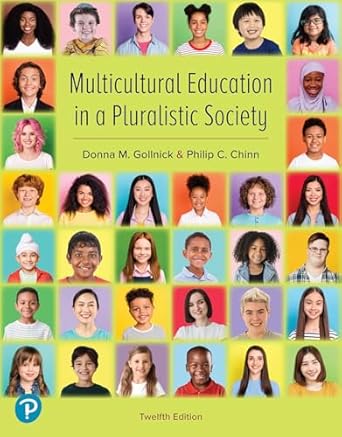Multicultural Education in a Pluralistic Society 12th Edition
by Donna M. Gollnick, Philip C. Chinn
Key Highlights
- •Comprehensive 12th Edition covering current issues in diversity.
- •Explores key dimensions: race, ethnicity, class, gender, religion, language, ability, etc.
- •Provides theoretical frameworks and practical strategies for educators.
Description
FAQ
Is this book only useful for teachers in the US?
While the examples primarily focus on the United States, the core concepts and frameworks for understanding diversity, equity, and multicultural education are applicable in many international contexts facing similar challenges in pluralistic societies.
I'm not a teacher or education student. Is this book still relevant for me?
Absolutely! Anyone interested in social justice, diversity, equity, and understanding the complexities of a multicultural society will find this book insightful. It provide valuable perspectives relevant to social work, community organizing, policy making, and general knowledge.
What makes the 12th edition different from previous ones?
The 12th edition features updated research, statistics, and discussions on contemporary issues related to diversity and education. It likely includes revised content reflecting recent social and political developments impacting multicultural education.
Does the book offer practical teaching strategies or is it mostly theoretical?
It strikes a balance. The book grounds its discussion in solid theory and research but also emphasizes practical applications and strategies that educators can implement in their classrooms to create more inclusive and equitable learning environments.
Are specific cultural groups discussed in detail?
Yes, the book examines various dimensions of diversity, including race, ethnicity, socioeconomic status, gender, sexual orientation, language, religion, and exceptionality, providing insights into different cultural groups within these contexts.
Is the language used very academic and difficult to understand?
While it's a comprehensive textbook, it's written to be accessible for its target audience (educators and students). It explain complex ideas clearly, though some familiarity with educational or sociological terms might be helpful.
Reader Reviews
About the Author
Donna M. Gollnick and Philip C. Chinn are highly respected scholars and leading authorities in the field of multicultural education. Their extensive research, teaching, and advocacy have significantly shaped the understanding and practice of diversity and equity in educational settings across the nation. Their work is widely recognized for its depth and practical relevance.
